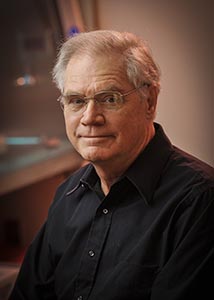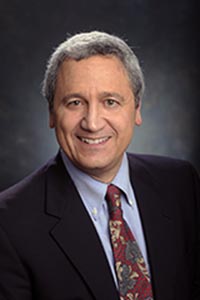 David Briles, Ph.D.University of Alabama at Birmingham Professor of Microbiology David Briles, Ph.D., and Professor of Optometry Lawrence DeLucas, O.D., Ph.D., have been named National Academy of Inventors Fellows.
David Briles, Ph.D.University of Alabama at Birmingham Professor of Microbiology David Briles, Ph.D., and Professor of Optometry Lawrence DeLucas, O.D., Ph.D., have been named National Academy of Inventors Fellows.
Election to NAI Fellow status is a high professional distinction accorded to academic inventors who have demonstrated a prolific spirit of innovation in creating or facilitating outstanding inventions that have made a tangible impact on quality of life, economic development and the welfare of society.
The 143 innovators elected to NAI Fellow status represent 94 universities and governmental and non-profit research institutes. Together, they hold more than 5,600 U.S. patents.
Briles joined UAB’s Department of Microbiology in the School of Medicine in 1978. Since 1979, his work has focused on proteins that are candidate antigens for pneumococcal vaccines. Alongside colleagues and trainees, Briles holds several patents on pneumonia vaccines.
“I’m real pleased to be recognized by the NAI,” Briles said. “I think it’s really nice, but nothing would have been patented if it weren’t for the large number of people who have worked for me over the years.”
Because of the complexity of the present pneumococcal capsular polysaccharide vaccines, Briles says they are too expensive to use in developing countries. His work has aimed at changing that.
“Our whole purpose was never to make something to make money, but to make something to be used in poor countries around the world,” Briles said.
 Lawrence DeLucas, O.D., Ph.D.In addition to his longstanding work at UAB, Briles has served on advisory boards for the National Institutes of Health, the World Health Organization and the Pan-American Health Organization. Briles’ work has been largely supported by NIH, and he has also done vaccine research for the PATH foundation.
Lawrence DeLucas, O.D., Ph.D.In addition to his longstanding work at UAB, Briles has served on advisory boards for the National Institutes of Health, the World Health Organization and the Pan-American Health Organization. Briles’ work has been largely supported by NIH, and he has also done vaccine research for the PATH foundation.
DeLucas is recognized as one of the pioneers in proteomic research — which is the large-scale study of proteins. DeLucas was a flight payload specialist aboard the NASA space shuttle Columbia, STS-50, on a two-week space mission launched June 25, 1992, requiring his involvement in more than 31 biophysical and fluid dynamic experiments during his mission on the space shuttle.
He was also appointed and served as the NASA chief scientist for the International Space Station at NASA headquarters in Washington, D.C., from 1994 to 1995. As chief scientist, DeLucas was responsible for focusing a large co-investigator group consisting of scientists and engineers from universities, pharmaceutical companies and government laboratories from around the globe in collaboration with NASA. DeLucas received NASA’s Public Service Medal for exemplary performance in support of the Microgravity Projects Office in 1997.
DeLucas has published more than 148 peer-reviewed scientific articles, has co-written two books on protein crystal growth, and is an inventor on 32 patents involving protein crystal growth, protein formulations and protein-based therapeutics developed with structure-based drug discovery.
In addition to his faculty appointment in the School of Optometry, DeLucas serves as director of the Center for Biophysical Sciences and Engineering and as director and a senior scientist at the UAB Comprehensive Cancer Center X-ray Crystallography Shared Facility.
“My career has involved the development of novel technologies that enable or enhance biotechnology research,” DeLucas noted. “It is gratifying to know that my past discoveries and patents have been recognized and that I will soon be named an NAI Fellow.”
The NAI Fellows will be inducted by Deputy U.S. Commissioner for Patents Andy Faile, from the United States Patent and Trademark Office, during the 3rd Annual Conference of the National Academy of Inventors, on March 7, 2014, in Alexandria, Va., at the headquarters of the U.S. Patent and Trademark Office. Fellows will be presented with a special trophy and a rosette pin.